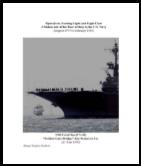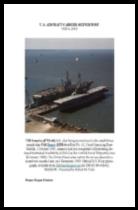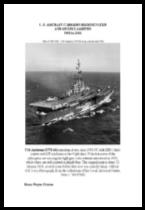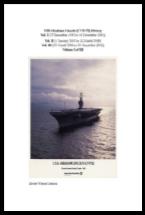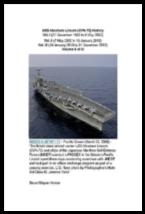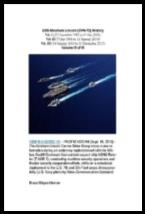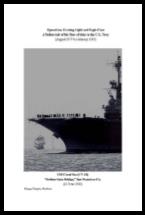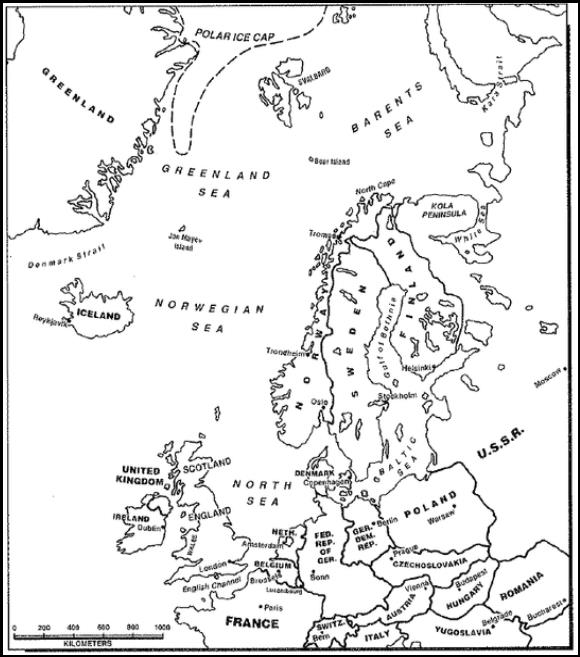






|
CHAPTER X to XI (9 January to 30 November 1952) |

|
Good image of Midway as designed/completed. She would look nothing like this at the end of her career, modified into a totally different ship. (Looks like Navy Day parade image.) Battle Carrier Air Group (CVBG) 1 on deck. L. Russell Porter notes: "The photo [...] was taken [...] on arriving in Gibraltar, 47–48 cruise to the Med. I have an original of that photo and I was there, and it was dress ship. I was a printer working in print shop at this time printing the 'Midway Current' - NS024109 - Scott Odell, (MM3 USN-RET)." http://www.navsource.org/archives/02/024109.jpg
|
|
A Sailors tale of his Tour of duty in the U.S. Navy (August 1977 to February 1983) Operation Evening Light and Eagle Claw - 24 April 1980
Book - ISBN NO. 978-1-4276-0454-5 EBook - ISBN NO. 978-1-329-15473-5
Operations Evening Light and Eagle Claw (24 April 1980) Iran and Air Arm History (1941 to 1980)
Book ISBN NO. xxxxxxxxxxxxx EBook ISBN NO. 978-1-329-19945-3
U. S. AIRCRAFT CARRIER SHIP HISTORY (1920 to 2019)
Book - ISBN NO. 978-1-4276-0465-1 EBook - ISBN NO. 978-1-365-25019-4 Library of Congress Control Number: 2008901616 (Book Version)
U. S. AIRCRAFT CARRIERS REDESIGNATED AND OR RECLASSIFIED (1953 to 2016)
BOOK - ISBN NO. 978-1-4276-0452-1 EBook - ISBN NO. 978-1-365-25041-5 Library of Congress (Book Version) 2008901619
ENERGY QUEST AND U. S. AIRCRAFT CARRIER DEPLOYMENT HISTORY INVESTMENT CAPITAL REQUIRED TO PUBLISH 55 EIGHTH HUNNDRED PAGE BOOKS, EBOOKS & CD’s (48 Navy Books)
Book - ISBN NO. To Be Announced EBook - ISBN No. 978-1-365-26038-4
USS Abraham Lincoln (CVN-72) History Vol. I of III (27 December 1982 to 6 May 2003)
Book Vol. I of IV ISBN: TBA EBook Vol. I of IV ISBN: 978-1-365-73794-7
USS Abraham Lincoln (CVN-72) History Vol. II of III (7 May 2003 to 13 January 2010)
Book - ISBN NO. To Be Announced EBook - ISBN NO. 978-1-365-74027-5
USS Abraham Lincoln (CVN-72) History Vol. III of III (14 January 2010 to 31 December 2012)
Book - ISBN NO. To Be Announced EBook - ISBN No. 978-1-365-74145-6
USS Coral Sea CV-42 CVB-43 CVA-43 and CV-43 History and Those Aircraft Carriers Operating with Coral Sea During Her Tour of Service CONSTRUCTION to LAUNCHING and EARLY JET AIRCRAFT DEVELOPMENT (10 July 1944—2 April 1946) and a Tour of Duty in the U. S. Navy (August 1977 to February 1983)
ISBN: 9781434382917
|
|
Fifth Mediterranean Sea deployment operating with the 6th Fleet conducting Operation Grand Slam, supporting NATO's operation, a multi-national English, French, Italian and U. S. exercise, with other units of the SIXTH Fleet and ships of the Italian, English, and French Navy (9 January to 5 May 1952), underwent general repairs, unkeep and brought on provisions, conducted feasibility of the angled deck concept, demonstrated in tests conducted on a simulated angled deck aboard USS Midway (CVB-41) by Naval Air Test Center pilots and Atlantic Fleet pilots in both jet and prop aircraft (26 to 29 May 1952) and operated off the east coast taking two Midshipman cruises to Halifax, Nova Scotia, Canada (July and August 1952). (9 January to 25 August 1952) CHAPTER X
“USS Midway (CVB-41) with Commander, Carrier Air Group Six (CVG-6) and as the flagship of Rear Admiral Austin K. Doyle, USN, Commander Carrier Division FOUR embarked departed Norfolk, Va. 9 January 1952, with Captain Kenneth Craig, USNA ‘26, as Commanding Officer, on her fifth Mediterranean Sea deployment operating with the 6th Fleet, to participate in Operation Grand Slam, supporting NATO's operation, a multi-national English, French, Italian and U. S. exercise, with other units of the SIXTH Fleet and ships of the Italian, English, and French Navy, steaming through the Atlantic, operating with the U.S. Atlantic Command (USLANTCOM) (Atlantic Fleet), operational control extending to the U.S. Second Fleet and ComAirLant to the Mediterranean Sea and upon completion of this exercise, will operate in the eastern Mediterranean Sea. She will under go her sixth Foreign Water Fleet Deployment (FWFD) since her commission 10 September 1945, having the destination of being the lead ship of her class, and the first to be commissioned after the end of World War II” (Ref. 1-Midway, 72 & 1178-G).
USS Midway (CVB-41) with CVG-6 (C) (9 January to 5 May 1952)
“USS Midway (CVB-41) arrived at Gibraltar on 21 January 1952 as the flagship of Rear Admiral Austin K. Doyle, USN, Commander Carrier Division FOUR” (Ref. USS MIDWAY Command History for Calendar Year 1952).
“On 26 February 1952 USS Midway (CVB-41) got underway from Genoa, Italy, for the Central Mediterranean to participate in Operation Grand Slam, supporting NATO's operation, a multi-national English, French, Italian and U. S. exercise, with other units of the SIXTH Fleet and ships of the Italian, English, and French Navy. As part of MDAP, the USAF began the ground and flight training of French pilots and navigators who would fly B-26s in Indochinaand upon completion, of this exercise. Upon completion Operation Grand Slam, Midway operated in the eastern Mediterranean Sea” (Ref. 1087, USS MIDWAY Command History for Calendar Year 1952, USS Midway (CV 41) WestPac Cruise Book 1987-89 & USS MIDWAY Command History for Calendar Year 1952). https://www.navysite.de/cruisebooks/cv41-88/index.html https://www.navysite.de/cruisebooks/cv41-88/002.htm
“USS Midway (CVB-41) participated in Operation Grand Slam, supporting NATO's operation, a multi-national English, French, Italian and U. S. exercise, with other units of the SIXTH Fleet and ships of the Italian, English, and French Navy from 26 February to 5 March 1952 and she returned to Genoa the next day, later sailing for SIXTH Fleet exercises off Suda Bay, Crete, and Phaleron Bay, Greece. As part of MDAP, the USAF began the ground and flight training of French pilots and navigators who would fly B-26s in Indochinaand upon completion, of this exercise. Upon completion Operation Grand Slam, Midway operated in the eastern Mediterranean Sea” (Ref. 1087, USS MIDWAY Command History for Calendar Year 1952, USS Midway (CV 41) WestPac Cruise Book 1987-89 & USS MIDWAY Command History for Calendar Year 1952). https://www.navysite.de/cruisebooks/cv41-88/index.html https://www.navysite.de/cruisebooks/cv41-88/002.htm
“Captain Frank O'Beirne, USNA ‘26, assumed command during a change of command ceremony aboard USS Midway (CVB-41) on 2 April 1952, relieving Captain Kenneth Craig, USNA ‘26, 10th Commanding Officer, serving from March 8, 1951 - April 2, 1952” (Ref. 1178-G).
LCDR Marlin Vincent Egert in the cockpit. USS Midway (CVB-41), 1952. NS0241au. http://www.navsource.org/archives/02/0241au.jpg
AD-4 Skyraider, Attack Squadron (VA) 25 "Tigers," Carrier Air Group (CVG) 6. USS Midway (CVB-41), 1952. NS0241av. http://www.navsource.org/archives/02/0241av.jpg
Hackett in a crash landing. This plane ended up "in the drink." USS Midway (CVB-41), 1952. NS0241aw. http://www.navsource.org/archives/02/0241aw.jpg
“USS Midway (CVB-41) departed Gibraltar on 23 April 1952” (Ref. USS MIDWAY Command History for Calendar Year 1952).
“On 5 May 1952, USS Midway (CVB-41) with Commander, Carrier Air Group Six (CVG-6) and as the flagship of Rear Admiral Austin K. Doyle, USN, Commander Carrier Division FOUR embarked arrived Norfolk, Va., with Captain Frank O'Beirne, USNA ’26, relieving Captain Kenneth Craig, USNA ‘26, as Commanding Officer, ending her fifth Mediterranean Sea deployment operating with the 6th Fleet, steaming through the Atlantic, operating with the U.S. Atlantic Command (USLANTCOM) (Atlantic Fleet), operational control extending to the U.S. Second Fleet and ComAirLant to the Mediterranean Sea, arriving at Gibraltar on 21 January 1952 as the flagship of Rear Admiral Austin K. Doyle, USN, Commander Carrier Division FOUR. On 26 February 1952, Midway got underway from Genoa, Italy, for the Central Mediterranean with other units of the SIXTH Fleet and ships of the Italian, English, and French Navy, supporting NATO's Operation Grand Slam, a multi-national English, French, Italian and U. S. Exercise, with other units of the SIXTH Fleet and ships of the Italian, English, and French Navy from 26 February to 5 March 1952 and she returned to Genoa the next day, later sailing for SIXTH Fleet exercises off Suda Bay, Crete, and Phaleron Bay, Greece. As part of MDAP, the USAF began the ground and flight training of French pilots and navigators who would fly B-26s in Indochinaand upon completion, of this exercise. Upon completion Operation Grand Slam, Midway operated in the eastern Mediterranean Sea. Captain Frank O'Beirne, USNA ‘26, assumed command during a change of command ceremony aboard Midway on 2 April 1952; relieving Captain Kenneth Craig, USNA ‘26, 10th Commanding Officer, serving from March 8, 1951 - April 2, 1952. Midway departed Gibraltar on 23 April 1952. Carrier Air Group SIX, operating from the Midway, set a new record for the number of hours flown aboard any carrier in the Mediterranean Sea. Ports of call include: Genoe or Genoa pron, the capital of Liguria and the sixth largest city in Italy and Gibraltar, a British overseas territory located on the southern end of the Iberian Peninsula at the entrance of the Mediterranean. Squadrons: VF-21, F9F-2; VF-61, F9F-2; VF-41, F4U-4; VA-25, AD-4; VMF-225 (*1), F4U-4, VC-12 Det., AD-4W; VC-33 Det., AD-4N; VC-62 Det., F2H-2P; HU-2 Det. and HO3S-1, HUP-1. (*1) VMF-225 redesignated VMA-225 on Jun.15, 1952. Her sixth Foreign Water Fleet Deployment (FWFD) since her commission 10 September 1945, having the destination of being the lead ship of her class, and the first to be commissioned after the end of World War II (9 January 1952 to 5 May 1952)” (Ref. 1-Midway, 72, 1178-G, 1087, USS MIDWAY Command History for Calendar Year 1952, USS Midway (CV 41) WestPac Cruise Book 1987-89 & USS MIDWAY Command History for Calendar Year 1952). https://www.navysite.de/cruisebooks/cv41-88/index.html https://www.navysite.de/cruisebooks/cv41-88/002.htm
09/01/52 to 05/05/52
“USS Midway (CVB-41) underwent routine overhaul and repairs upon return from the Mediterranean Sea on 5 May 1952” (Ref. 1175G).
“From 26 to 29 May 1952, the feasibility of the angled deck concept was demonstrated in tests conducted on a simulated angled deck aboard USS Midway (CVB-41) by Naval Air Test Center pilots and Atlantic Fleet pilots in both jet and prop aircraft” (Ref. 1- Midway & 72).
Fifth Mediterranean Sea deployment and 1952 Senior Command and Staff CHAPTER X Appendix I
USS Midway (CVB 41) Mediterranean Cruise Book 1952
Table of Contents: https://www.navysite.de/cruisebooks/cv41-52/index.html
https://www.navysite.de/cruisebooks/cv41-52/010.htm
https://www.navysite.de/cruisebooks/cv41-52/011.htm
https://www.navysite.de/cruisebooks/cv41-52/012.htm
https://www.navysite.de/cruisebooks/cv41-52/013.htm
https://www.navysite.de/cruisebooks/cv41-52/014.htm
https://www.navysite.de/cruisebooks/cv41-52/015.htm
Third North Atlantic deployment conducting Operation Main Brace,” an eighth nation NATO maneuver in the northeastern Atlantic, off Norway and Denmark, steaming in formation with the carriers USS Frankland D. Roosevelt (CVA-42), USS Wasp (CVA-18), and battleship USS Wisconsin (BB-64) (26 August to 8 October 1952); underwent general repairs, unkeep and brought on provisions prior to her sixth Mediterranean Sea on 8 October 1952; after exercises off Newport, Rhode Island, Midway underwent minor repairs in the Norfolk, Va. Navy Yard from 24 October to 14 November 1952, when she resumed local operations, out of Norfolk, Va. (26 August to 30 November 1952) CHAPTER XI
“USS Midway (CVB-41) with Rear Admiral A, K. Doyle, USN, Commander of a Task Force and Commander, Carrier Air Group Six (CVG-6) embarked departed Norfolk Va. 26 August 1952, with Captain Frank O'Beirne, USNA ‘26, as Commanding Officer, on her third North Atlantic deployment, operating with the U.S. Atlantic Command (USLANTCOM) (Atlantic Fleet), operational control extending to the U.S. Fleet and ComAirLant, to participate in North Sea maneuvers with North Atlantic Treaty Organization (NATO) forces in support of Operation Main Brace,” an eighth nation NATO maneuver in the northeastern Atlantic, off Norway and Denmark, steaming in formation with the carriers USS Frankland D. Roosevelt (CVA-42), USS Wasp (CVA-18), and battleship USS Wisconsin (BB-64), making Midway his Flagship. She will under go her seventh Foreign Water Fleet Deployment (FWFD) since her commission 10 September 1945, having the destination of being the lead ship of her class, and the first to be commissioned after the end of World War II” (Ref. 1-Midway, 72 & USS MIDWAY Command History for Calendar Year 1952).
USS Midway (CVB-41) with CVG-6 (C) (26 August to 8 October 1952)
“USS Midway (CVA-41) arrived at Firth of Clyde, Greenock, Scotland on 10 September 1952.
After two days in port of Firth of Clyde, Greenock, Scotland from 10 to 12 September 1952, USS Midway (CVA-41) put to sea for "Operation Mainbrace" in the northeastern Atlantic, steaming in formation with the carriers USS Frankland D. Roosevelt (CVA-42), USS Wasp (CVA-18), and battleship USS Wisconsin (BB-64)” (Ref. USS MIDWAY Command History for Calendar Year 1952).
“Commander Carrier Division Four, Rear Admral Stuart H. Ingersoll, U.S.N. relieved Rear Admiral A, K. Doyle, USN, as Commander Carrier Division FOUR, Commander of a Task Force in the North Sea off Norway and Denmark, making USS Midway (CVB-41) there Flagship on 12 September 1952” (Ref. 1175G, 1175I & USS Midway (CV 41) WestPac Cruise Book 1987-89). https://www.navysite.de/cruisebooks/cv41-88/index.html https://www.navysite.de/cruisebooks/cv41-88/002.htm
Operation Mainbrace – Ref. 1090
“Exercise Mainbrace was the first large-scale naval exercise undertaken by the newly established Allied Command Atlantic (ACLANT), one of the two principal military commands of the North Atlantic Treaty Organization (NATO). It was part of a series of NATO exercises jointly commanded by Supreme Allied Commander Atlantic Admiral Lynde D. McCormick, USN, and Supreme Allied Commander Europe General Matthew B. Ridgeway, U.S. Army, during the Fall of 1952. Initial planning for Exercise Mainbrace was initiated by General Dwight D. Eisenhower prior to his resignation as NATO's Supreme Allied Commander Europe (SACEUR) to run for the President of the United States. The exercise itself was commanded jointly by SACLANT Admiral Lynde D. McCormick, USN, and SACEUR General Matthew B. Ridgeway, U.S. Army, with the immediate theater commander being Admiral Sir Patrick Brind, RN, who was in Commander-in-Chief Allied Forces Northern Europe” (Ref. [4], [5], [6], [7], [8] & [9] of 1090).
“Mainbrace was conducted over twelve days between September 14–25, 1952, and involved nine navies: United States Navy, the British Royal Navy, French Navy, Royal Canadian Navy, Royal Danish Navy, Royal Norwegian Navy, Portuguese Navy, Royal Netherlands Navy, and Belgian Naval Force operating in the Norwegian Sea, the Barents Sea, the North Sea near the Jutland Peninsula, and the Baltic Sea. Its objective was to convince Denmark and Norway that those nations could be defended against attack from the Soviet Union.[4] The exercise featured simulated carrier air strikes against "enemy" formation attacking NATO's northern flank near Bodř, Norway, naval air attacks against aggressors near the Kiel Canal, anti-submarine and anti-ship operations, and U.S. marines landing in Denmark” (Ref. [5], [6], [7], [8], [9], [10] & [11] of 1090).
“Eighty thousand men, over 200 ships, and 1,000 aircraft participated in the Mainbrace. The New York Times' military reporter Hanson W. Baldwin described this NATO naval force as being the "largest and most powerful fleet that has cruised in the North Sea since World War I"” (Ref. [12] & [13] of 1090).
https://en.wikipedia.org/wiki/Exercise_Mainbrace#/media/File:NATO_Northern_Flank.png
Blue Fleet Fast Carrier Task Force – Ref. 1090
USS Franklin D. Roosevelt with Carrier Air Group 17 (CVG-17): Ref. [14]
USS Midway with Carrier Air Group 6 (CVG-6): Ref. [15]
USS Wasp and Carrier Air Group 1 (CVG-1): Ref. [16]
HMS Illustrious: Ref. [18]
4 Naval Air Squadron 860 Naval Air Squadron - Royal Netherlands Navy
Battleships
Cruisers
Amphibious force flagship
Other NATO Military Exercises - Fall 1952
“Two exercises were conducted by NATO's Allied Forces Southern Europe during the Fall of 1952.[19] Ancient Wall was a series of military maneuvers involving ground small unit tactical training, land-based tactical air support, and carrier-based air support.[20] Longstep was a ten-day naval exercise held in the Mediterranean Sea during November 1952 involving over 170 warships and 700 aircraft under the overall command of Admiral Carney. The objective of the Allied ("Blue") forces was to dislodge enemy ("Green") invasion forces from their occupying positions in the Eastern Mediterranean. Blue naval forces were centered around the U.S. Sixth Fleet, under the command of Vice Admiral John H. Cassady, USN, and its two aircraft carriers, the Franklin D. Roosevelt and Wasp. Green forces included submarines and land-based aircraft. The exercise concluded with an amphibious landing at Lebidos Bay south of İzmir, involving 3000 French, Italian, and Greek troops, including the Battalion Landing Team 3/2, under the overall command of General Robert E. Hogaboom, USMC” (Ref. [19], [20] & [21] of 1090).
Aftermath
“The Soviet Union characterized Mainbrace, Holdfast, and other NATO military exercises as "war-like acts" by NATO, with particular reference to the participation of Norway and Denmark, while the USSR was preparing for its own military maneuvers in the Soviet Zone” (Ref. [6] & [8] of 1090).
Seas break over the bow of HMS Vanguard making a high speed run https://en.wikipedia.org/wiki/File:HMS_Vanguard_-_Operation_Mainbrace_1952_-_I03681.jpg
“Operation Mainbrace" in the northeastern Atlantic, combined maneuvers were conducted 12 to 24 September 1952 and Commander Carrier Division Four, Rear Admral Stuart H. Ingersoll, U.S.N. relieved Rear Admiral A, K. Doyle, USN, as Commander Carrier Division FOUR, Commander of a Task Force in the North Sea off Norway and Denmark, making USS Midway (CVB-41) there Flagship on 12 September 1952, steaming in formation with the carriers USS Frankland D. Roosevelt (CVA-42), USS Wasp (CVA-18), and battleship USS Wisconsin (BB-64).
“USS Midway (CVB-41) arrived at Cherbourg, France, on 26 September 1952 and was visited by the Mayor of that city.
USS Midway (CVB-41) cleared Cherbourg Harbor on 29 September 1952 and touched at Plymouth, England, the same day” (Ref. USS MIDWAY Command History for Calendar Year 1952).
“The Midway (CVB-41), the 35th aircraft carrier of the United States Navy by Hull No. and in order of commission, the 35th, commissioning on 10 September 1945, was redesignated CVA-41 on 1 October 1952” (Ref. 1-Midway, 72, 1082 & USS MIDWAY Command History for Calendar Year 1952).
“On 8 October 1952, USS Midway (CVA-41) with Commander Carrier Division Four, Rear Admral Stuart H. Ingersoll, U.S.N., relieving Rear Admiral A, K. Doyle, USN, Commander of a Task Force and Commander, Carrier Air Group Six (CVG-6) embarked arrived Norfolk Va., with Captain Frank O'Beirne, USNA ‘26, as Commanding Officer, ending her third North Atlantic deployment, operating with the U.S. Atlantic Command (USLANTCOM) (Atlantic Fleet), operational control extending to the U.S. Fleet and ComAirLant, participating in North Sea maneuvers with NATO forces. Midway arrived at Firth of Clyde, Greenock, Scotland on 10 September 1952. After two days in port of Firth of Clyde, Greenock, Scotland from 10 to 12 September 1952, Midway and put to sea for "Operation Mainbrace" in the northeastern Atlantic (12 to 24 September 1952), steaming in formation with the carriers USS Frankland D. Roosevelt (CVA-42), USS Wasp (CVA-18), and battleship USS Wisconsin (BB-64). Commander Carrier Division Four, Rear Admral Stuart H. Ingersoll, U.S.N. relieved Rear Admiral A, K. Doyle, USN, as Commander Carrier Division FOUR, Commander of a Task Force in the North Sea off Norway and Denmark, making Midway there Flagship on 12 September 1952. Midway arrived at Cherbourg Harbor, France, on 26 September 1952 and was visited by the Mayor of that city, then cleared Cherbourg Harbor on 29 September 1952 and touched at Plymouth, England, the same day.The Midway (CVB-41) was redesignated CVA-41 on 1 October 1952. Ports of call include: Greenock, a town and administrative centre in the Inverclyde council area in Scotland, United Kingdom, and a former burgh within the historic county of Renfrewshire, located in the west central Lowlands of Scotland; Cherbourg, a city and commune, situated on the Cotentin peninsula in the Manche department of Lower Normandy in north-western France and Plymouth, a city and unitary authority area on the south coast of Devon, England, about 190 miles (310 km) south-west of London. It is situated between the mouths of the rivers Plym to the east and Tamar to the west, where they join Plymouth Sound. Squadrons: VF-21, F9F-2; VF-61, F9F-2; VF-41, F4U-4; VF-42, F4U-4; VA-25, AD-4; VC-8, AJ-1 (A-2A); VC-12 Det., AD-4W; VC-33 Det., AD-4N; VC-62 Det., F2H-2P and HU-2 Det., HUP-1. Her seventh Foreign Water Fleet Deployment (FWFD) since her commission 10 September 1945, having the destination of being the lead ship of her class, and the first to be commissioned after the end of World War II (26 August to 8 October 1952)” (Ref. 1-Midway, 72, 1082, [14], [15], [16] , [17], [18], [19], [20] & [21] of 1090, USS MIDWAY Command History for Calendar Year 1952, 1175G, 1175I & USS Midway (CV 41) WestPac Cruise Book 1987-89). https://www.navysite.de/cruisebooks/cv41-88/002.htm
26/08/52 to 01/10/52
“USS Midway (CVA-41) underwent general repairs, unkeep and brought on provisions prior to her sixth Mediterranean Sea on 8 October 1952” (Ref. 1175G).
“After exercises off Newport, Rhode Island, USS Midway (CVA-41) entered the Norfolk, Va. Navy Yard on 24 October 1952 for minor repairs” (Ref. USS MIDWAY Command History for Calendar Year 1952).
“Commander Albert B. Furer assumed his duties as Executive Officer of USS Midway (CVA-41) on 8 November 1952” (Ref. 1175C1 & USS MIDWAY Command History for Calendar Year 1952).
“USS Midway (CVA-41) underwent minor repairs in the Norfolk, Va. Navy Yard from 24 October to 14 November 1952, when she resumed local operations, out of Norfolk, Va.” (Ref. USS MIDWAY Command History for Calendar Year 1952).
“In 1951-1952, the Royal Navy developed the concept of an angled landing area on carriers. An aircraft that missed the arresting wires could accelerate and take off again, rather than crash into a barrier or aircraft parked at the forward end of the flight deck. In 1952, USS Midway (CVA-42) had an angled-deck layout painted on her flight deck and conducted touch and-go landings. Midway’s arresting gear and barriers remained rigged for centerline or axial landings. The trials were a success, and later that year the carrier USS Antietam (CVA-36) became the world’s first angled-deck carrier. The shift from piston-engine to turbojet aircraft and the value of the angled flight deck to carrier operations led to the three Midways undergoing major modifications” (Ref. 1083).
|
||||||||||||||||||||||||||||||||||||||||||||||||||||||||||||||||||||||||||||||||||||||||||||||||||||||||||||||||||||||||||||||||||||||||||||||||||||||||||||||||||||||||||||||
